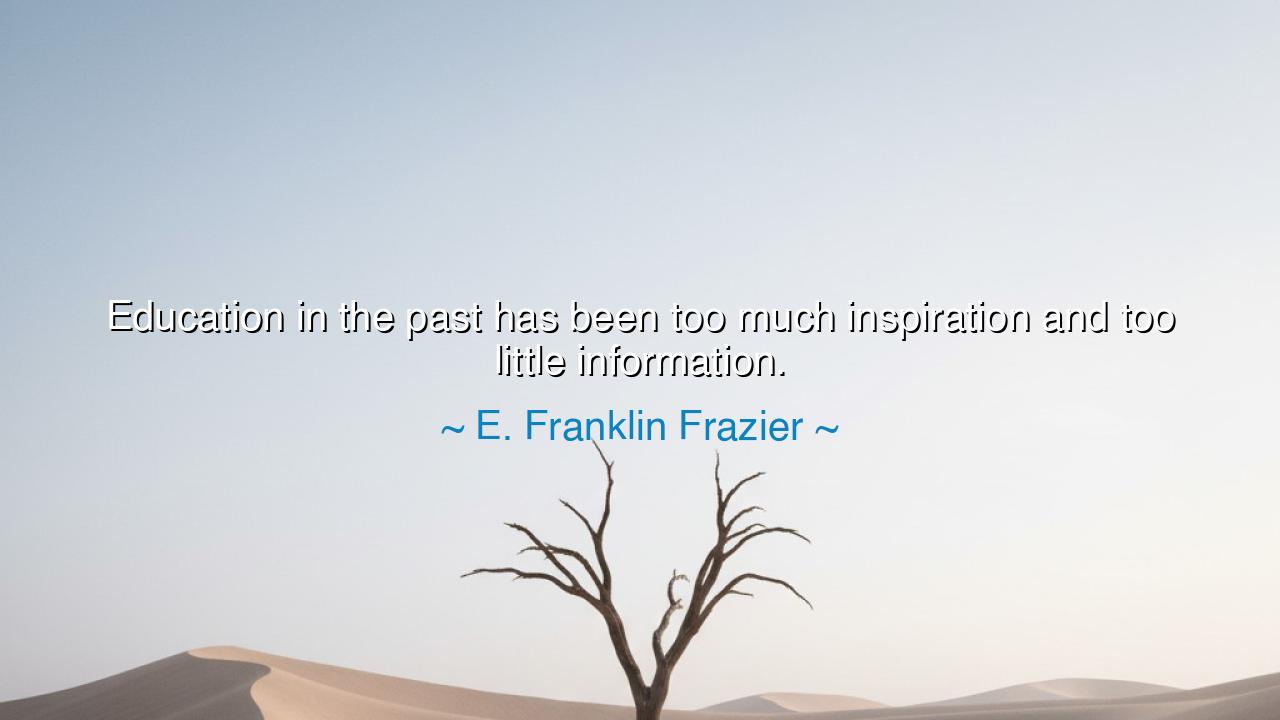
Education in the past has been too much inspiration and too






“Education in the past has been too much inspiration and too little information.” Thus declared E. Franklin Frazier, the great sociologist and thinker who sought to awaken the conscience of a generation. His words strike with the clarity of a bell that summons us from dream to duty. He spoke not against inspiration, for that is the spark that kindles the flame of ambition — but he warned that fire alone cannot forge the tools of wisdom. Without information, without knowledge grounded in truth and understanding, inspiration becomes a fleeting wind — stirring for a moment, but leaving no structure behind.
Frazier lived in a time of transformation — the early twentieth century — when education for many, especially African Americans, was still a fragile hope rather than a universal right. He saw that too often, the schools and churches of his day filled hearts with noble ideals and stirring visions of progress, yet failed to arm minds with the hard facts, the practical skills, and the critical reasoning needed to bring those visions into being. “Too much inspiration and too little information” — it was his lament that many were taught to dream without being taught how to build. In his eyes, true education was not the worship of words, but the mastery of reality; not the praise of possibility alone, but the discipline to make it flesh.
In the ancient world, the wise men of every civilization knew this balance. The Greeks had their poets and orators to stir the heart, but they also had their philosophers and mathematicians to train the mind. Plato did not only inspire his students with talk of ideals; he taught them logic, geometry, and the structure of thought itself. The Chinese sage Confucius, too, knew that moral beauty was nothing without understanding — that to lead others, one must first learn the names and nature of things. Thus, civilization grew not from inspiration alone, but from information woven with wisdom — from the union of passion and precision, of fire and form.
Frazier’s words, then, were both a criticism and a prophecy. He saw that in his time, many schools were temples of emotion rather than laboratories of truth. Teachers spoke of greatness, of destiny, of moral uplift — yet too few taught their students the sciences, the economics, the languages, and the history that could turn ideals into action. He feared that a people raised on dreams alone would find themselves forever dependent on those who possessed knowledge. To dream of freedom, one must know how to secure it. To speak of progress, one must understand the machinery that drives it. Without information, inspiration collapses into illusion.
Consider the example of Booker T. Washington, a man who understood the necessity of balance. When he founded the Tuskegee Institute, he declared that education must be both of the head and the hand. He inspired his students to believe in their worth and dignity, but he also trained them in agriculture, architecture, and industry. His graduates built roads, schools, and businesses; they turned inspiration into power. It was precisely this marriage of knowledge and vision that allowed a people, long enslaved, to rise with pride and purpose. Washington embodied the truth that Frazier would later speak — that education must be both fire and foundation.
Yet in every age, humanity forgets this wisdom. Even today, we celebrate eloquence more than expertise, passion more than precision. Our schools too often teach children to feel, but not to think; to hope, but not to inquire. We are surrounded by a flood of inspiration, yet thirst for the clear water of information. The mind that burns without grounding in knowledge may shine brightly for a moment — but like a flame without oil, it soon dies. True education must build the temple of reason upon the rock of fact, lest all the beauty of idealism collapse into dust.
So, my child, remember the lesson of Frazier’s words: let your heart be inspired, but let your mind be informed. Do not seek only to feel — seek also to understand. Read deeply, question boldly, and measure all things against the truth. Inspiration gives you wings, but information gives you direction; without both, you will fly only in circles. Strive, therefore, to balance vision with study, emotion with intellect, faith with reason.
For the progress of any person — and of any people — depends on this sacred balance. Inspiration lights the path, but information builds the road. One without the other is like a song without rhythm, or a dream without dawn. Let your education be whole — filled with wonder, but anchored in knowledge — and you will not only dream of a better world, but help to bring it into being.






AAdministratorAdministrator
Welcome, honored guests. Please leave a comment, we will respond soon